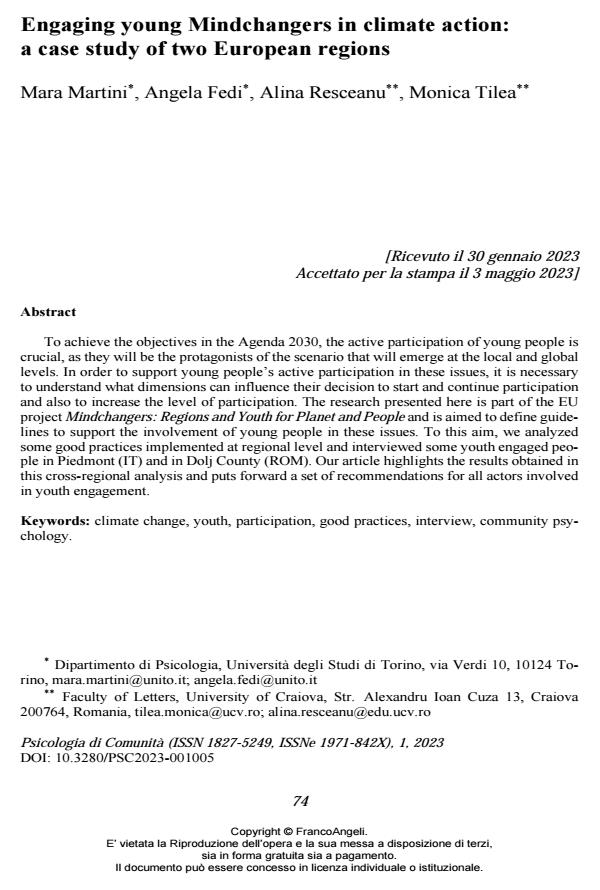Engaging young Mindchangers in climate action: a case study of two European regions
Journal title PSICOLOGIA DI COMUNITA’
Author/s Mara Martini, Angela Fedi, Alina Resceanu, Monica Tilea
Publishing Year 2023 Issue 2023/1
Language English Pages 19 P. 74-92 File size 258 KB
DOI 10.3280/PSC2023-001005
DOI is like a bar code for intellectual property: to have more infomation
click here
Below, you can see the article first page
If you want to buy this article in PDF format, you can do it, following the instructions to buy download credits

FrancoAngeli is member of Publishers International Linking Association, Inc (PILA), a not-for-profit association which run the CrossRef service enabling links to and from online scholarly content.
To achieve the objectives in the Agenda 2030, the active participation of young people is crucial, as they will be the protagonists of the scenario that will emerge at the local and global levels. In order to support young people’s active participation in these issues, it is necessary to understand what dimensions can influence their decision to start and continue participation and also to increase the level of participation. The research presented here is part of the EU project Mindchangers: Regions and Youth for Planet and People and is aimed to define guidelines to support the involvement of young people in these issues. To this aim, we analyzed some good practices implemented at regional level and interviewed some youth engaged people in Pied-mont (IT) and in Dolj County (ROM). Our article highlights the results obtained in this cross-regional analysis and puts forward a set of recommendations for all actors involved in youth engagement.
Keywords: climate change, youth, participation, good practices, interview, community psychology.
- Adams, M. (2016). Ecological crisis, sustainability and the psychosocial subject. London: Palgrave Macmillan.
- Albanesi, C., Guarino, A., Zani, B., Cicognani, E., & Tzankova, I. (2019). Civic engagement in a changing world: Does it contribute to the development of global citizenship?. TPM: Testing, Psychometrics, Methodology in Applied Psychology, 26(4), 495-511.
- Benzaghta, M. A., Elwalda, A., Mousa, M. M., Erkan, I., & Rahman, M. (2021). SWOT analysis applications: An integrative literature review. Journal of Global Business Insights, 6(1), 55-73. DOI: 10.5038/2640-6489.6.1.114
- Brügger, A., Gubler, M., Steentjes, K., & Capstick, S. B. (2020). Social identity and risk perception explain participation in the swiss youth climate strikes. Sustainability, 12(24), 10605.
- European Commission (2022). Flash Eurobarometer 502 (Youth and Democracy in the European Year of Youth). GESIS, Cologne.
- Goldman, L. (2022). Climate change and youth: Turning grief and anxiety into activism. Taylor & Francis.
- Hill, T., & Westbrook, R. (1997). SWOT analysis: it’s time for a product recall. Long range planning, 30(1), 46-52. DOI: 10.1016/S0024-6301(96)00095-
- Hügel, S., & Davies, A. R. (2020). Public participation, engagement, and climate change adaptation: A review of the research literature. Wiley Interdisciplinary Reviews: Climate Change, 11(4), e645.
- Junker, B., Buchecker, M., & Müller‐Böker, U. (2007). Objectives of public participation: Which actors should be involved in the decision making for river restorations?. Water Resources Research, 43(10). DOI: 10.1029/2006WR00558
- King, N. (1998). Template analysis. In G. Symon & C. Cassell (Eds.), Qualitative methods and analysis in organizational research: A practical guide (pp. 118-134). London: Sage Publications Ltd.
- Mannarini, T., Pozzi, M., & Meneghini, A. (2022). Partecipazione. In C. Arcidiacono, N. De Piccoli, T. Mannarini & E. Marta (Eds.), Psicologia di Comunità. Prospettive e concetti chiave (Vol. 1, pp. 107-121). Milano: FrancoAngeli.
- Marshall, G. (2014). Five. In J. Smith, R. Tyszczuk, & R. Butler (Eds.), Culture and climate change: Narratives (Vol. 2, pp. 96-97). Cambridge: Shed.
- Masson, T., & Fritsche, I. (2021). We need climate change mitigation and climate change mitigation needs the ‘We’: A state-of-the-art review of social identity effects motivating climate change action. Current Opinion in Behavioral Sciences, 42, 89-96.
- Openpolis (2021). Giovani e comunità. La partecipazione giovanile e i patti educativi, tra scuola e territorio. https://www.openpolis.it/wp-content/uploads/2021/ 12/giovani-e-comunita.pdf
- Park, H. J., & Lin, L. M. (2020). Exploring attitude–behavior gap in sustainable consumption: Comparison of recycled and upcycled fashion products. Journal of Business Research, 117, 623-628.
- Rosenblatt, G. (2010). The Engagement Pyramid: Six Levels of Connecting People and Social Change. http://groundwire.org/blog/groundwire-engagement-pyramid/
- Tilea, M., Duță, O. A., & Reșceanu, A. (Eds.). (2017). Sustainable and Solidary Education: Reflections and Practices. Berlin: Peter Lang Verlag.
- Tilea, M, Reșceanu, A., & Reșceanu, I. (2021). Mind-changing perspectives on education: A content analysis of young people’s storytelling-based interviews. In Analele Universității „Ovidius”, Constanța, Seria Filologie, Vol. XXXII, 2, pp. 394-411.
- Van Zomeren, M., & Iyer, A. (2009). Introduction to the social and psychological dynamics of collective action. Journal of Social Issues, 65(4), 645-660.
- Whitmarsh, L., O’Neill, S., & Lorenzoni, I. (2013). Public engagement with climate change: What do we know and where do we go from here? International Journal of Media & Cultural Politics, 9(1), 7-25.
- Educating Youth to Civic Engagement for Social Justice: Evaluation of a Secondary School Project Mara Martini, Chiara Rollero, Marco Rizzo, Sabrina Di Carlo, Norma De Piccoli, Angela Fedi, in Behavioral Sciences /2023 pp.650
DOI: 10.3390/bs13080650
Mara Martini, Angela Fedi, Alina Resceanu, Monica Tilea, Engaging young Mindchangers in climate action: a case study of two European regions in "PSICOLOGIA DI COMUNITA’" 1/2023, pp 74-92, DOI: 10.3280/PSC2023-001005